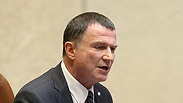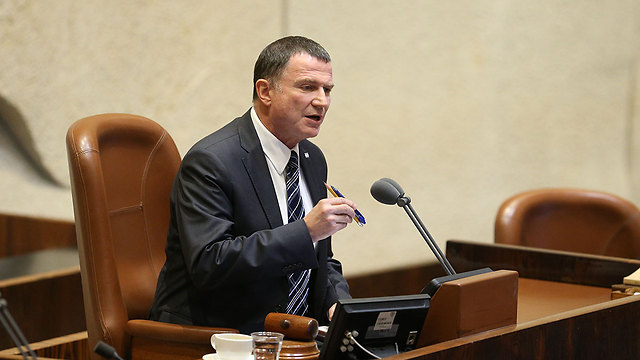
Yuli Edelstein
צילום: עמית שאבי
Knesset chairman to address Russian parliament
Returning to the country 30 years after his release from a Soviet prison, Yuli Edelstein prepares to deliver a speech to the Duma during an official visit; ‘the symbolism...cannot be ignored,’ says Edelstein.
Knesset Speaker Yuli Edelstein (Likud) is expected to deliver a speech before the Russian parliamentary plenary session in Moscow at the end of next month, during which he will reflect on the past 30 years since being released from Soviet incarceration.
Prior to his imprisonment, Edelstein was denied the right, along with thousands of other Soviet Jews, to emigrate to Israel. Only in 1987 when he was released from the USSR’s prison did he finally make aliyah.
The speech, which will be made as part of a state visit to Russia, will be the first to take place in the Duma (Russia’s parliament) by an incumbent Knesset chairman. Edelstein will be hosted by Valentina Matviyenko, chairman of the Russian Federation Council, the upper chamber of the Russian parliament.
The former Soviet prisoner will deliver his speech both in Hebrew and in Russian and will also meet during his 3-day stay with Russian Foreign Minister Sergei Lavrov, Chairman of the State Duma Vyacheslav Volodin, and Russian members of parliament affiliated with the Association for Friendship with the Knesset.
In addition, Edelstein will meet with leaders of the Jewish community in Moscow and will visit the Jewish Museum and Tolerance Center. He will also tour areas in the Russian capital where he was an activist as a “refusenik,” (an individual who was denied the right to emigrate to Israel by Soviet authorities), including the site where he was arrested and the court where he was tried and sentenced to jail.
“Obviously this is a special and very exciting visit. The aim is to develop further the excellent relations between the states and especially the ties between the Knesset and the Russian parliament that we have developed,” Edelstein said. “They are better than ever before, with excellent cooperation in different fields and with a deep friendship.”
But Edelstein also reflected on the symbolic power of his journey from a Soviet prisoner to an Israeli politician occupying one if the country’s most prestigious roles.
“But the symbolism of a person who was a prisoner in the Soviet Union and will now stand before parliament in Moscow and deliver a speech as the Knesset chairman cannot be ignored.”











